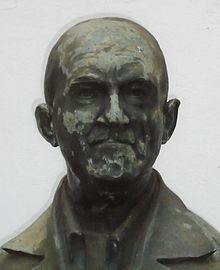
| This article needs additional citations for verification. Please help improve this article by adding citations to reliable sources. Unsourced material may be challenged and removed. Find sources: "Alberto da Veiga Guignard" – news · newspapers · books · scholar · JSTOR (December 2021) (Learn how and when to remove this message) |
Alberto da Veiga Guignard also known as Alberto Guignard or Guignard (25 February 1896 — 25 June 1962) was a Brazilian painter who became renowned for his depictions of the landscapes of Minas Gerais.
Guignard was born in Nova Friburgo in the state of Rio de Janeiro. He was born with a cleft lip and palate. Guignard's father died when he was a child. His mother remarried and moved with Alberto to Germany to be with her new husband Louis von Schilgen, a baron.
In Europe, Guignard began studying painting at the age of 11 and continued his studies for the next 22 years. He attended the Academy of Fine Arts in Munich, where he studied with Herman Groeber and Adolf Engeler and visited Florence.
After he returned to Brazil in 1929, he became an examplar of Brazilian Modernist painting alongside Candido Portinari, Ismael Nery and Cícero Dias.

In 1931 he took part in the group exhibition Salão Revolucionário (Revolutionary Salon) at the Escola Nacional de Belas Artes in Rio de Janeiro, the first of its annual exhibitions to host modernists.
He became a mentor to painters such as Iberê Camargo, Vera Mindlin and Alcides da Rocha Miranda. In 1944, Guignard was invited by Juscelino Kubitschek, then mayor of Belo Horizonte, to establish a program for drawing and painting at the newly created Instituto de Belas Artes (now the Guignard University of Art of Minas Gerais). He lived in Belo Horizonte until his death in 1962.
Guignard had several exhibitions in Brazil. In 1953, he was honored with a retrospective in the Museu de Arte Moderna do Rio de Janeiro and, in 1992, at the Museu Lasar Segall.
His body was entombed in the Church of São Francisco de Assis in Ouro Preto.
Record sale
In August 2015, his painting Vaso de Flores was sold for R$5.7 million, becoming the most expensive work of art by a Brazilian artist ever auctioned.
References
- Martin, Dolores Moyano (1999-01-01). Handbook of Latin American Studies: Humanities. University of Texas Press. ISBN 9780292752313.
- Bethell, Leslie (1998-08-13). A Cultural History of Latin America: Literature, Music and the Visual Arts in the 19th and 20th Centuries. Cambridge University Press. ISBN 9781316583890.
- "Salão Revolucionário". Enciclopédia Itaú Cultural (in Brazilian Portuguese). Instituto Itaú Cultural. 23 May 2018. Retrieved 12 June 2022.
- "\'Vaso de flores\', de Guignard, torna-se a obra mais cara de um brasileiro vendida em leilão". O Globo (in Brazilian Portuguese). 14 August 2015. Retrieved 2015-12-30.
- Additional sources
- "Guignard". Enciclopédia Itaú Cultural (in Brazilian Portuguese). Instituto Itaú Cultural. 5 April 2021. Retrieved 14 June 2022.
External links
- Visita virtual imersiva ao Museu Casa Guignard, em Ouro Preto, MG
- Guignard em Ponto "D" Vista
- Projeto Guignard Archived 2015-12-22 at the Wayback Machine
- Guignard, Filho de Nova Friburgo Archived 2016-01-14 at the Wayback Machine